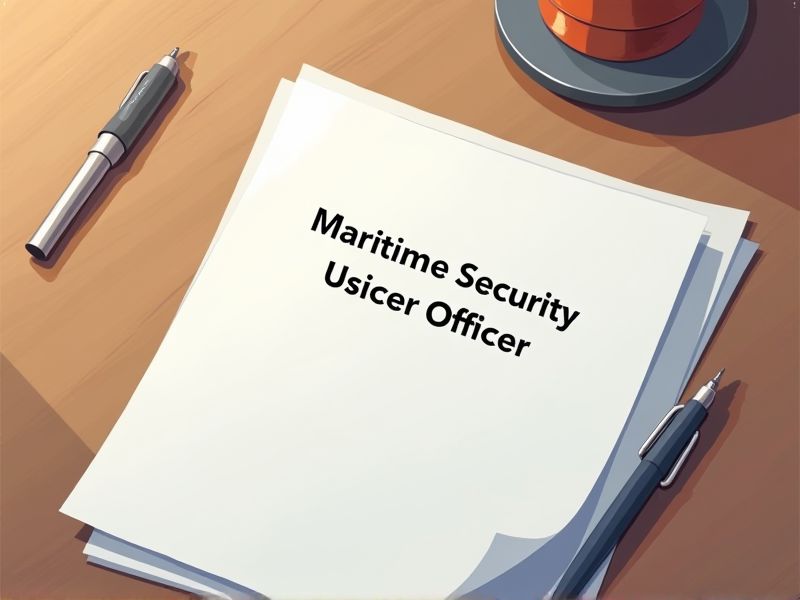
Maritime Security Officers play a crucial role in safeguarding vessels, ports, and international waters, necessitating a specialized skill set. Certifications ensure they possess the knowledge to handle complex security challenges and comply with international maritime regulations. Specific credentials validate their competency in areas like risk assessment, crisis management, and anti-terrorism measures. Notable certifications that may be required to excel in this role include various specialized training and accreditations.
International Ship and Port Facility Security (ISPS) Code Certification
International Ship and Port Facility Security (ISPS) Code Certification forms a crucial part of a Maritime Security Officer's qualifications due to its role in preemptively identifying and neutralizing security threats to ships and port facilities. Without the certification, there could be increased risks in maritime operations, leading to potential breaches that endanger both assets and personnel. The ISPS Code ensures standardized security measures, thus fostering safer and more secure international shipping routes. Its implementation can directly reduce incidents of piracy, terrorism, and illegal trafficking in maritime sectors.
STCW Basic Safety Training Certificate
STCW Basic Safety Training Certificate ensures Maritime Security Officers possess fundamental safety skills that are essential for managing emergencies at sea. The training includes fire prevention, first aid, and personal survival techniques, which are crucial in protecting both crew and passengers. These competencies enhance the officer's ability to handle hazardous situations effectively, contributing to overall vessel safety. Compliance with international maritime regulations is achieved through this certification, which is often obligatory for employment in maritime security roles.
Ship Security Officer (SSO) Certification
Ship Security Officer (SSO) certification equips maritime security personnel with the skills necessary to develop and implement ship security plans. International regulations, such as the ISPS Code, mandate this certification to ensure standardized security measures on vessels. SSO certification enables officers to efficiently conduct security assessments and implement countermeasures for potential threats. This specialized training also ensures coordination with port facilities and other security stakeholders, enhancing overall maritime safety.
Company Security Officer (CSO) Certification
Obtaining a Company Security Officer (CSO) Certification equips Maritime Security Officers with specialized knowledge on international maritime security regulations. It ensures compliance with the International Ship and Port Facility Security (ISPS) Code, which is essential to maintaining operational legitimacy. Certified officers are more adept at assessing risks and responding to threats, enhancing overall safety and security measures. Employers in the maritime industry often prioritize certified individuals, leading to better career opportunities and professional recognition.
Maritime Anti-Piracy and Armed Robbery Training
Maritime security officers face increased piracy threats, leading to a need for specialized anti-piracy training. Thorough training enables officers to develop effective strategies for safely managing hostile encounters at sea. Without this expertise, the risk to crew safety and cargo security significantly escalates. A well-trained officer contributes to reduced economic losses by effectively minimizing piracy incidences.
Counter-Terrorism and Maritime Security Certification
Maritime security officers face evolving threats from piracy and terrorism, which necessitates specialized counter-terrorism training to develop effective response strategies. This certification ensures officers understand international legal frameworks, which is critical for maintaining compliance with maritime laws. Enhancing skills in threat assessment and crisis management, the certification enables officers to preemptively identify and mitigate potential maritime risks. Without this certification, maritime security officers might lack crucial skills to safeguard shipping lanes and protect global trade integrity.
Risk Assessment and Management Certification
Maritime security officers face complex threats such as piracy and smuggling, necessitating comprehensive risk assessment skills to mitigate these dangers effectively. Certification in risk management equips officers with the methodology to identify, analyze, and prioritize potential maritime threats, which enhances overall maritime security operations. Regulatory agencies and maritime organizations require certified personnel to ensure compliance with international safety and security standards. The credential validates an officer's ability to implement proactive measures, minimizing security breaches and financial losses in the maritime industry.
Emergency Response and Crisis Management Certification
Emergency Response and Crisis Management Certification equips Maritime Security Officers with essential skills to handle incidents at sea, minimizing risks and potential damages. The unpredictable nature of maritime environments, including threats like piracy and natural disasters, demands specialized training for effective crisis mitigation. Certified officers demonstrate competence in coordinating with international regulations, ensuring safety compliance and protecting crew and cargo. Enhanced training increases readiness and reliability, contributing to overall maritime operational security and efficiency.
Maritime Cyber Security Certification
Cyber threats pose significant risks to maritime operations, and without proper cybersecurity training, vulnerabilities can lead to disruptions. A Maritime Cyber Security Certification ensures that a Maritime Security Officer is equipped to identify and mitigate cyber threats effectively. With increasing reliance on digital systems, a certified officer can safeguard sensitive information and critical infrastructure from cyberattacks. Compliance with international regulations and standards is essential, and certification helps security officers meet these requirements, enhancing overall maritime security.
Crisis Communication and Public Relations for Maritime Security Certification
Maritime security officers often face complex situations where effective crisis communication is crucial in managing potential threats and ensuring safety. Public relations skills enable these officers to effectively communicate with stakeholders, fostering trust and transparency. A specialized certification in this field equips officers with the tools and knowledge to handle media interactions and public statements during security incidents. Such certifications enhance an officer's capability to maintain calm and order, preventing misinformation and facilitating rapid response in critical scenarios.
Summary
When you obtain certifications as a Maritime Security Officer, your expertise and credibility in the field increase, enhancing your professional value. This can result in better job opportunities and potential salary increments, as employers often prioritize certified individuals. With certifications, you gain specialized skills and knowledge, improving situational awareness and response in maritime security scenarios. Enhanced competence may lead to greater trust from peers and supervisors, reinforcing your role as a key asset in security operations.
